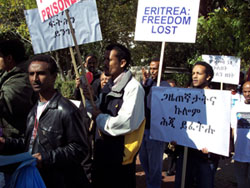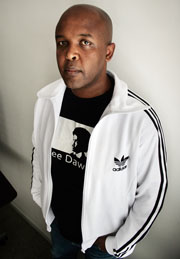|
Eritrea Politics | Human rights | Society Eritrea "intimidates emigrants into paying tax" Eritrean activists demonstrate at the Eritrean Embassy in Washington DC The Information Ministry in the Eritrean capital Asmara regularly proudly sends out messages about Eritreans in Europe and North America participating in large demonstrations in support of the regime. But most of these demonstrators had themselves fled repression and human rights abuses by the same regime.
The protesters claimed that Eritrean authorities were into "blackmailing" and "surveillance" of them in Norway. Eritreans abroad are forced to pay a 2 percent "tax" of their income to the regime back home. "Thousands of Eritrean agents" are spying on the Diaspora abroad, intimidating them into paying the tax. If the tax is not paid, emigrated Eritreans are denied work, inheritance, entry to Eritrea and family members back home are given fines and are harassed by authorities, organisers of the Eritrean protest march told Norwegian media. Kidane Mahari, one of the few 3,400 Eritreans living in Norway daring to present himself with his real name, told the Norwegian state broadcaster 'NRK' that he had refused to pay this illegal tax to the Eritrean regime. "But this means that I cannot travel and visit my family, I cannot inherit my parents and I cannot invest in the country," he told 'NRK'. Mr Mahari added that he knew of fellow Eritrean migrants that had experienced tough sanctions against their families in Eritrea for not paying the "tax". "We know of parents losing their licence to engage in trade because their son abroad had not paid the tax," he told 'NRK'. Eritrean authorities confirm the existence of a 2 percent tax, but claim it is voluntary. Eritrean emigrants not paying the "tax" would still be able to travel to the country but were blocked from doing business or inheriting, an embassy spokesman however confirmed. But most Eritrean emigrants are still living in fear. During the Oslo protest march, the Eritrean protesters were photographed and filmed, allegedly by agents from the Asmara regime. As several photographers were spotted by the crowd, they were attacked and their cameras confiscated by the protesters. Protesters claimed the photos would be used to identity the oppositional persons among the Diaspora, which could have fatal consequences for family member back in Eritrea. Fear in Sweden The Oslo protest, with hundreds of Eritrean immigrants daring to participate, however still is a rare event. In neighbouring Sweden, where the Stockholm government has taken a tough stance on Eritrea after the 2001 arrest of Eritrean-Swedish journalist Dawit Isak, the numerous Eritrean Diaspora still lives in fear of Eritrean agents. Esayas Isak, a younger brother of journalist Dawit living in Sweden's second city Gothenburg, is frustrated about this culture of fear. There are about 3,000 Eritreans in Gothenberg, but only 25-30 of them showed up for a protest recently organised in support for Mr Isak's famous imprisoned brother. "Most of the 3,000 knew Dawit but they will not support him," Mr Isak says. He knows that the reason is that most "fear a reprisal against their family or business back in Eritrea." He adds: "Eritreans I used to speak to avoid me now that I am involved in activism." The power of government agents is still to be broken in the Swedish city. By staff writers © afrol News - Create an e-mail alert for Eritrea news - Create an e-mail alert for Politics news - Create an e-mail alert for Human rights news - Create an e-mail alert for Society news
On the Afrol News front page now
|
front page
| news
| countries
| archive
| currencies
| news alerts login
| about afrol News
| contact
| advertise
| español
© afrol News. Reproducing or buying afrol News' articles.
You can contact us at mail@afrol.com









